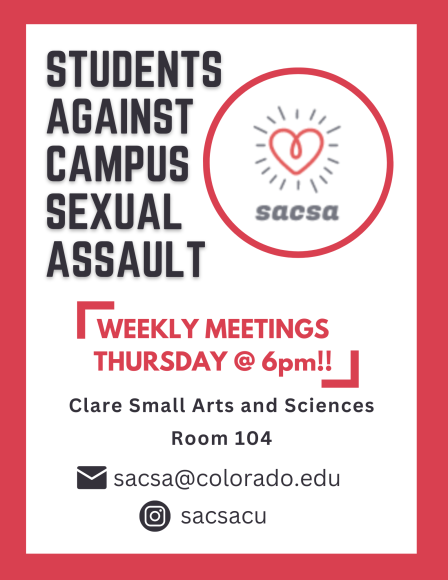
Poster for the Students Against Campus Sexual Assault. (Courtesy of Eswari Duggirala)
Editor’s Note: This story contains descriptions of sexual violence and assault.
Students who have experienced a traumatic incident can contact free and confidential support resources through the University of Colorado Boulder’s Office of Victim Assistance on their website or by calling 303-492-8855.
Moving to End Sexual Assault provides support to survivors in the broader Boulder area. Information on their resources can be found here or by calling 303-443-7300.
Editor’s Note: A previous version of this story misreported that the purpose of the sexual misconduct town hall was to address recent concerns of sexual violence-related crimes in the community. The university held the town hall to review data from the 2021 sexual misconduct survey and to discuss plans for the Sexual Misconduct Task Force. It has since been corrected.
There is also further clarification that the university cannot share details on specific cases due to privacy laws.
The University of Colorado Boulder’s new Students Against Campus Sexual Assault (SACSA) committee hosted its first meeting on Monday, Oct. 17. With over 30 students in attendance, the committee discussed the impact of sexual violence on the CU Boulder community.
“We want to foster a community around the issue of sexual violence at our university,” said SACSA co-founder Eswari Duggirala, a senior at CU Boulder. “There are so many people at CU Boulder that have been affected by this issue, and there aren’t that many outlets for support other than campus services. This is the first student-led organization that has directly addressed the issue.”
“We realized that when it came to student voices and student action, there was almost a non-existent collective response or an organized response,” said co-founder Hima Kilaru, a senior at CU Boulder.
Community members have expressed concern for CU Boulder’s handling of sexual violence-related crimes on campus. Related to this, the university hosted a town hall reviewing the data from the 2021 sexual misconduct survey and explaining the role of the Sexual Misconduct Task Force.
During this town hall, Kilaru voiced her concern, alongside several other SACSA members.
“We felt like they weren’t addressing sexual assault as an epidemic,” Kilaru said. “Though [the university] sends emails once every year, which caution females or other victims to be careful, we feel like they’re not nipping the issue at the bud. They’re not addressing the actual issue.”
The meeting focused on how to create administrative change to minimize sexual assault on campus, as well as how to support those who have already survived an assault.
“Having a community to talk about this with and also educating people about the issue of sexual violence is really important, and [at SACSA], we hope we can do that,” Duggirala said.
The committee aims to offer support and resources for survivors in several ways.
“We want to do that by facilitating weekly meetings that have discussion panels, self-care workshops and guest speaker events,” Duggirala said. “We also want this to be a form of advocacy too, so we can create change at this university.”
Then, the meeting shifted into a discussion of how the committee can advocate for changes in university policy. SACSA board members discussed their plans to create an “advocacy letter” that would be sent to university leadership, including Chancellor Philip DiStefano, in hopes of improving the university’s response to sexual crimes on campus. According to Duggirala, the letter would include a compilation of CU Boulder’s previous responses to sexual violence and to what extent these were not adequate. However, due to federal privacy laws, the university cannot discuss specific cases in its communications.
“Everybody knows that CU [Boulder] does not respond well, but they don’t have this specific proof of [this],” Duggirala said.
To have more impact on the CU Boulder community, members of SACSA hope to increase awareness of their mission and to build a larger committee throughout the year.
“We want a lot of people to start coming to weekly meetings because we believe in the power of proximity,” Duggirala said. “The more numbers there are in our organization, the bigger changes we will see.”
Contact CU Independent Staff Writer Jessi Sachs at Jessi.Sachs@colorado.edu.
